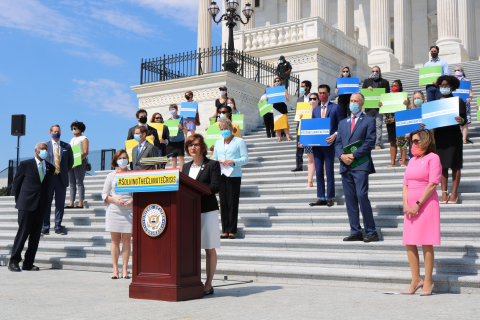After more than a year of hearings, meetings, and briefings, the Select Committee on the Climate Crisis has released a comprehensive plan that will protect our planet and make our communities and economy stronger, healthier, and fairer. You can read the full report, “Solving the Climate Crisis: The Congressional Action Plan for a Clean Energy Economy and a Healthy, Resilient, and Just America.”
The committee was charged with crafting a bold, science-based, comprehensive climate action plan to address the climate crisis and reach net-zero emissions no later than mid-century and net-negative thereafter. It focused on the needs of frontline communities, opportunities to accelerate our transition to a 100 percent clean energy economy, and ways to create good-paying jobs. The final Climate Action Plan reflects an outpouring of input from thousands of community members and leaders from Oregon and around the country.
According to an independent analysis and modeling, implementing their plan would:
- Reduce net overall U.S. greenhouse gas emissions by 37 percent below 2010 levels in 2030, and 88 percent below 2010 levels in 2050;
- Provide nearly $8 trillion in cumulative climate and health benefits through 2050; and
- Avoid 62,000 premature deaths annually by 2050.
The Climate Action Plan is a roadmap for Congress, and you can learn more about it here. Ms. Bonamici, 1st district of Oregon member of Congress sat on the committee and is working to promote its goals. She says:
Addressing the Scale of the Crisis
As we know too well in Northwest Oregon, climate change is already our reality. The science is clear and alarming, and we must act immediately. According to an independent analysis and modeling, implementing this Climate Action Plan would:
- Reduce net overall U.S. greenhouse gas emissions by 37% below 2010 levels in 2030, and 88% below 2010 levels in 2050;
- Provide nearly $8 trillion in cumulative climate and health benefits through 2050; and
- Avoid 62,000 premature deaths annually by 2050.
Economic, environmental, and racial justice are intertwined, and equity is at the core of our Climate Action Plan. Addressing the climate crisis will create millions of good-paying, high-quality jobs that can help working families and displaced workers recover from the economic collapse caused by the COVID-19 pandemic. Low-income communities, communities of color, and Tribal and Indigenous communities have not only been hardest hit by the COVID-19 pandemic; they have also been disproportionately affected by the climate crisis. Building a resilient, clean economy using this climate action framework will boost our economic recovery and allow us to begin to repair the legacy of environmental racism and pollution that has burdened low-income communities and communities of color for decades.
How We Developed the Climate Action Plan
The process to develop our comprehensive climate action plan was robust. The Select Committee held 17 official hearings and six member-level round table discussions on a broad range of topics:
- Solving the Climate Crisis: Drawing Down Carbon and Building Up the American Economy
- Roundtable with Los Angeles Mayor Eric Garcetti
- Creating a Climate Resilient America
- Solving the Climate Crisis: Ramping Up Renewables
- Roundtable on Electricity Transmission Infrastructure
- Roundtable on Electricity Market Design
- Solving the Climate Crisis: Cleaning Up Heavy Duty Vehicles, Protecting Communities
- Creating a Climate Resilient America: Business Views on the Costs of the Climate Crisis
- Solving the Climate Crisis: Manufacturing Jobs for America’s Workers
- Voices Leading the Next Generation on the Global Climate Crisis (Joint Hearing with House Committee on Foreign Affairs)
- Roundtable on Nuclear Power
- Solving the Climate Crisis: Reducing Industrial Emissions Through U.S. Innovation
- Solving the Climate Crisis: Cleaner, Stronger Buildings
- Solving the Climate Crisis: Natural Solutions to Cutting Pollution and Building Resilience
- Solving the Climate Crisis: Opportunities in Agriculture
- Creating a Climate Resilient America: Reducing Risks and Costs
- Creating a Climate Resilient America: Smart Finance for Strong Communities
- Creating a Climate Resilient America: Overcoming the Health Risks of the Climate Crisis
- Discussion with the National Congress of American Indians
- Between February 2020 and the release of this report, the Select Committee met with and heard from experts to discuss the effects of the COVID-19 pandemic and economic slowdown on clean energy, climate resilience, and public health.
The Select Committee also requested information from experts and the public, receiving more than 700 substantive responses from stakeholders across the country.
